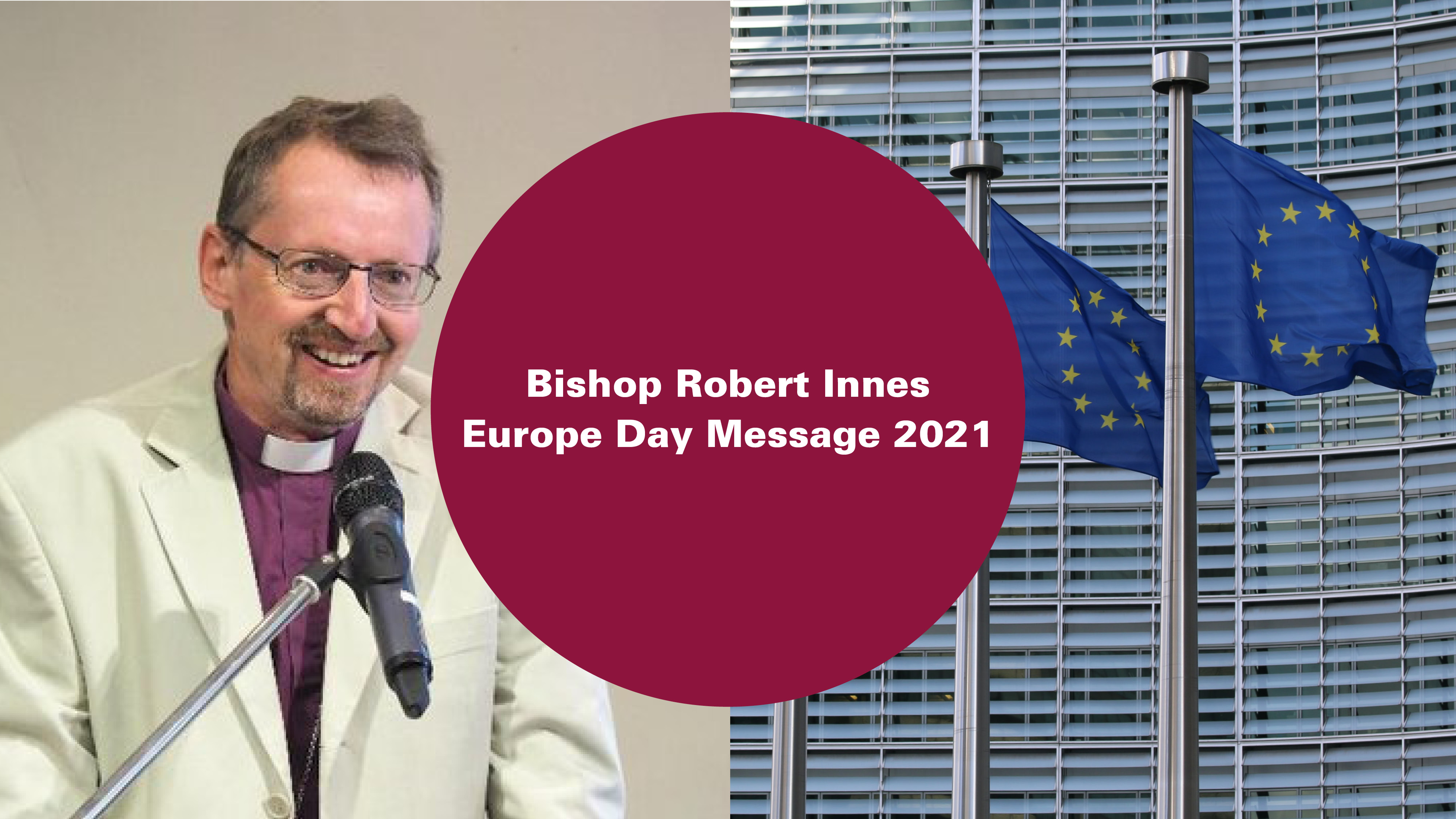Bishop Robert: A Message for Europe Day
Bishop Robert has issued this Message for Europe Day. You can also download an illustrated PDF of his Message here.

On 9 May, we will mark Europe Day, celebrating across the continent the first steps to building European Institutions that developed into the Council of Europe and the European Union. Jean Monnet, one of the architects of post-war European unity said the goal of European integration was to “make men work together to show them that beyond their differences and geographical boundaries there lies a common interest.” We continue to face two overriding challenges that defy geographical boundaries in their impacts. They summon a common interest in us all: global Pandemic and our global Climate.
There have now been well over 30 million Covid-19 infections across Europe; and more than 650,000 deaths. We pray for the plight of all who are suffering and perishing from this global disease. As Christians, our faith is rooted in hope. Vaccination programmes are gathering pace. We hope that the scientific innovation of vaccines that are now available, the organisation of public authorities at all levels in administering them, and the enduring patience of people as we await them, may allow vaccination targets to be reached across Europe, and enable us to see the first signs soon of a post-Pandemic recovery. I welcome warmly the contributions of Anglicans and other faith leaders to encourage vaccination campaigns nationally, and across Europe.
In 2021, we witness another renewed focus on a common interest that affects us all: care for our climate. Our young people are ever the torch bearers for causes and campaigns that matter. I am thrilled to share here the "Gee Seven" song recorded by young choristers of Truro Cathedral along with a message from their Diocesan Bishop, Bishop Philip Mounstephen, who has a longstanding involvement in diocesan ministry and life in Europe. The beautiful music performed by the choir has a deeply earnest side in its message, both for our global leaders and for us all. We are planning a pan-diocesan event bringing together our eco- and young people’s ministry in early September ahead of the Conference of Parties (COP 26) meeting in Glasgow in November. I am proud, too, of the local contributions to our Eco-Diocese agenda, from dedicated Lent commitments made to reducing plastic waste to the pioneering of the first ever City Forest in our Church, a microcosm oasis and a bio-diversity sustainability project in Italy. All these efforts are real examples of how we can all contribute both to national Church net zero carbon targets for 2030, as well as to the EU Green Deal package to make the EU carbon neutral by 2050.
At the same time, we have witnessed the upsurge of boundaries that are born of ignorance, prejudice, and lack of empathy for, and fear of the other. Someone once commented that the opposite of love is not hate, but indifference. We are sadly seeing this on racial and gender inequalities, and the ongoing pan-European challenges around migration and refugees. As Anglicans in Europe, we have taken a clear stand on racial injustice as has the national Church in its response. We are also actively campaigning on gender justice, notably in our ongoing support to the Council of Europe and the EU on ratification of the Istanbul Convention on preventing and combating violence against women and domestic violence. And on the scale of the refugee challenge, our hearts must surely be troubled by this one statistic reported in The Guardian: 17 child refugees arriving in Europe have disappeared every day since 2018. Immigration boundaries cannot possibly excuse a lack of human care and response on the parts of governments and public authorities.
We are Anglicans in a diverse Communion spanning over 165 countries, and we will continue to seek out opportunities to share experiences and approaches to combating racism and gender inequality in all their forms, as well as on migration and refugees, with faith partners and across global institutions where we have a voice, including in the EU and Council of Europe.
Finally, we continue to see the hindrance of religious expression and our ability to hindrance of religious expression and our ability to organise Church life in Europe. Where there are genuine concerns regarding religious extremism and radicalisation, Anglicans are completely open to discussion. But we are concerned at efforts that seek to constrain the voice of faith organisations in civil society. We will remain both vocal and vigilant on these issues, not least in EU Article 17 dialogues, and engaged in fostering integration and inclusion wherever we can in countries across Europe where we consider ourselves to be honoured guests.
We are a bridging Church and we will remain one, reaching across boundaries of the forty-two countries that make up our diocese. We are European Anglicans, working closely alongside our ecumenical and faith partners, engaging actively in dialogue across the European Institutions, and committed to playing our full part in the common interest that is building together the future of Europe.
The Rt Revd Dr Robert Innes


